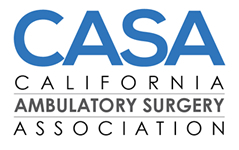About
Code of Conduct
The California Ambulatory Surgery Association (“CASA”) and each of its members agrees to adopt and implement policies to promote ethical management in the ambulatory surgery industry. Members shall promote the advancement of ambulatory surgery technology and methods, encourage educational activities demonstrating the benefits of ambulatory surgery, promote the efficient, safe and effective utilization of medical care resources and operate facilities in a fiscally responsible manner benefiting and protecting the general public.
As part of these ethical obligations each member agrees to observe, to the extent applicable to a facility, ethical business practices, including but not limited to:
A member facility should not charge or collect an illegal or excessive fee. A fee is considered excessive when, after a review of the facts, a person knowledgeable as to current charges made by facilities would be left with a definite and firm conviction that the fee is in excess of a reasonable fee. Factors to be considered as guides in determining the reasonableness of a fee include the following:
(1) The difficulty and/or uniqueness of the services performed and the time, skill, and experience required
(2) The fee customarily charged in the locality for similar care by facilities that are committed to providing safe and effective care in an efficient and fiscally responsible manner benefitting and protecting the general public
(3) The amount of the charges involved
(4) The quality of performance
(5) The experience, reputation, and ability of the facility in performing the kind of services involved
The above statement regarding fees is modeled from Opinion 6.05 (as modified in 1994) of the American Medical Association Code of Medical Ethics.
A member facility agrees to be transparent and lawful in its billing and collection practices. Factors to be considered as guides in determining transparency and lawfulness include the following:
(1) Timely pre and post-treatment notifications of the patient (or parent or legal conservator if the patient is a minor, or an adult with a legal conservatorship) of anticipated and real charges, and expectations regarding the financial responsibilities of the patient, parent or legal conservator, and of any third party payer to be billed.
(2) Avoidance of unlawful payments or other improper inducements for referral of patients to the facility. (amended 2013)



